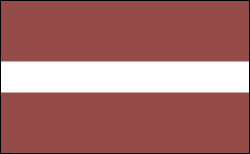- / Countries of the World
- / news and current events
Latvia News & Current Events

Index
- Latvia Profile
- History
- News and Current Events
Political Unrest Grows as the Economy Falters
Prime Minister Kalvitis resigned in Dec. 2007, following a series of widespread protests over his attempts to fire anti corruption investigator Aleksejs Loskutovs.
A series of riots sparked by political grievances and a worsening economy broke out in the capital, Riga, during Jan. 2009. Dozens were injured and more than 100 people were arrested in the violence.
Prime Minister Ivars Godmanis resigned in Feb. 2009, when the Latvian economy began to shrink at an alarming rate, a result of the global financial crisis. His government had become unpopular in 2008, when it was forced to increase taxes and cut public spending after the country's banking system collapsed. Valdis Dombrovskis of the center-right New Era party took over as prime minister in March, leading a six-party coalition government.
Latvia sunk deeper into a financial morass in 2009, with soaring unemployment that reached 22.3% in November—the highest rate in the EU—and heavy debt that prompted the government to implement steep budget cuts and turn to the IMF and the EU for a bailout. Dombrovskis lost his majority in parliament in March 2010 when his largest coalition partner bolted from the government in protest of the austerity measures. He resumed a majority after his coalition won 58.6% of the vote in October 2010 elections. His Unity party took 33 out of 100 seats, and his coalition partner, the Greens and Farmers Union, earned 22 seats.
Dombrovskis Resigns after Supermarket Collapse
Prime Minister Valdis Dombrovskis resigned on November 27, 2013, days after the roof of a supermarket collapsed in Riga, killing 54 people and wounding dozens. It was the worst disaster in Latvia since the ship Mayakovsky sank in Riga in 1950. State building inspections had been abolished due to budget cuts under the Dombrovskis administration.
In January 2014, President Andris Berzins designated Laimdota Straujuma prime minister. Straujuma had previously served as the minister for agriculture and the secretary of state of the Ministry for Regional Development and Local Government. She became the first woman to serve as prime minister in Latvia.
After the 2014 Parliamentary Election, President Berzins nominated Straujuma to head the new government even after Straujuma's party, the Unity Party, came in second. A center-left party, Harmony, came in first, taking 24 out of 100 seats, one ahead of the Unity party. On Nov. 5, 2014, Saeima, Latvia's parliament approved Straujuma's nomination to continue on as prime minister in the new government by a 61-39 vote.
Minister of Defense Raimonds Vejonis was elected president on June 3, 2015. A member of the Green Party, Vejonis vowed to protect the environment and increase national security during his acceptance speech. Vejonis took office the following month on July 8.
On Dec. 7, 2015, Prime Minister Laimdota Straujuma resigned due to increasing ruling coalition disputes. The media blamed her for struggling to work within the coalition over issues such as the 2015 European immigration crisis and the country's teacher strikes. After resigning, she released a statement that the government needed "new ideas, a new contribution and a new energy."
See also Encyclopedia: Latvia .
U.S. State Dept. Country Notes: Latvia
Central Statistical Bureau of Latvia www.csb.lv/avidus.cfm .
